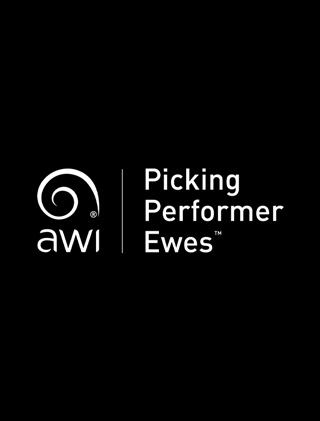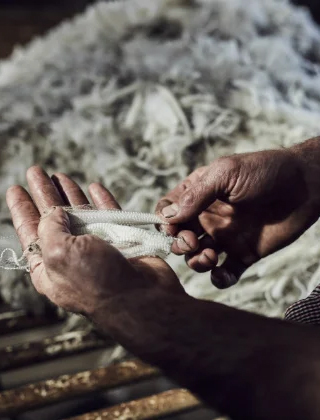Shearer and wool handler training
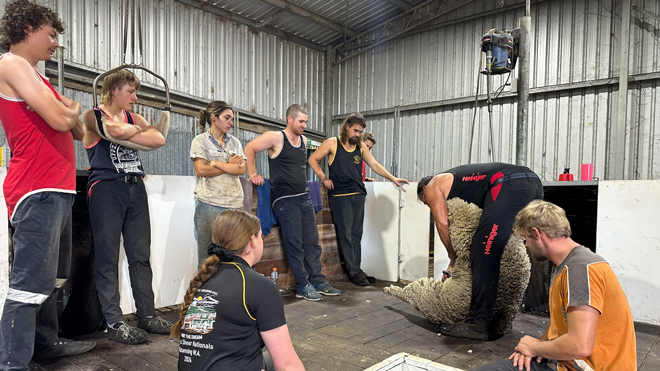
AWI funds hands-on, practical, in-shed training for shearers and wool handlers across the country to attract and retain new entrants into the wool harvesting industry; increase workers’ productivity, skills, and professionalism; and increase returns to woolgrowers through improved clip preparation practices.
AWI continues to fund and support hands-on, practical, in-shed training for shearers and wool handlers. Pictured below is a small selection of AWI-funded courses recently run across the country.
As well as improver workshops and novice workshops, AWI also funds education programs for high school students.
- Improver workshops – These are run to assist new entrants and learner shearers currently working in industry to improve their shearing and wool handling skills.
- Novice workshops – These provide school leavers and new entrants to the wool industry, generally aged 16 to 25, with training geared towards gaining full-time employment in the industry.
- Education programs – These are targeted at high school students in years 9 to 12 and have an emphasis on the variety of career pathways within the industry.
“With the increased availability of experienced shearers, across all states including those from overseas, the opportunity for someone completing a novice course to progress to a full-time stand has become more limited,” said AWI National Manager, Wool Harvesting Training & Careers Development, Craig French.
“As a result, AWI is placing more focus on mentoring and keeping full-time learner shearers engaged and improving their skills, with the aim to help retain them in teams on a stand. As well as training shearers, AWI also has a focus on attracting and retaining wool handlers and other wool harvesting staff.”
AWI has only a limited number of AWI Learner Shearer Toolkits left to present to learner shearers. Once this limited supply has been presented, likely by the end of this calendar year, then no more will be issued. The Toolkits contain a Heiniger handpiece and other shearing gear; the shearer must have passed certain strict criteria to receive them.
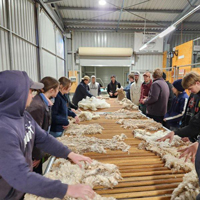
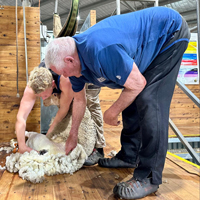
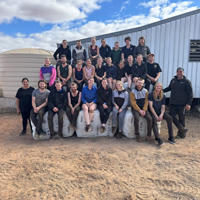 Jamestown, SA | Muresk, WA | Oakden Hills, SA
Jamestown, SA | Muresk, WA | Oakden Hills, SA
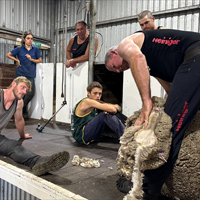
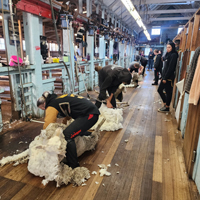
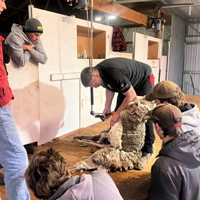
Broomehill, WA | Ross, TAS | Pinindi, SA
AWI-funded trainers carry out wool harvesting training in New South Wales, Western Australia, Queensland and Tasmania. In Victoria and South Australia, the AWI-funded training is provided by the Shearing Contractors Association of Australia Shearer Woolhandler Training Inc (SCAA SWTI).
AWI thanks all the woolgrowers who provide their facilities and sheep, and all the other organisations and individuals that lend their time and resources to help run this training.
To arrange training in your state, email craig.french@wool.com or swt@wool.com. Keep an eye on the Facebook channels of @australianwoolinnovation (NSW, WA, Qld) and @shearerwoolhandlertraining (Vic, SA, Tas) for the latest updates.
More information: www.wool.com/harvestingtraining
Training wool harvesting trainers
Trainers at the Western Australia workshop held at the WA College of Agriculture Narrogin.
Trainers at the NSW workshop held at Paraway Pastoral’s Cooinbil Station near Coleambally.
AWI-funded shearing and wool handling trainers in WA and NSW came together at workshops on best practice wool harvesting techniques, held in June at Narrogin and Coleambally respectively.
The WA and NSW workshops followed the similar workshop held in February at Naracoorte, South Australia, for SCAA SWTI trainers that carry out AWI-funded training in Victoria, South Australia and Tasmania (see the previous edition of Beyond the Bale).
Workshops such as these are held to ensure both current and new trainers carry out a consistent and high level of shearing and wool handling training at AWI-funded in-shed training and workshops. Topics at the recent workshops included best practice shearing patterns and footwork, best practice grinding and gear selection for different types of sheep and different districts, consistent terminology used by trainers to guide shearers and wool handlers, and animal welfare training.
The high quality of training benefits woolgrowers by increasing the availability of skilled and professional wool harvesting staff and improved clip preparation practices.
This article appeared in the Spring 2025 edition of AWI’s Beyond the Bale magazine that was published in September 2025. Reproduction of the article is encouraged.






